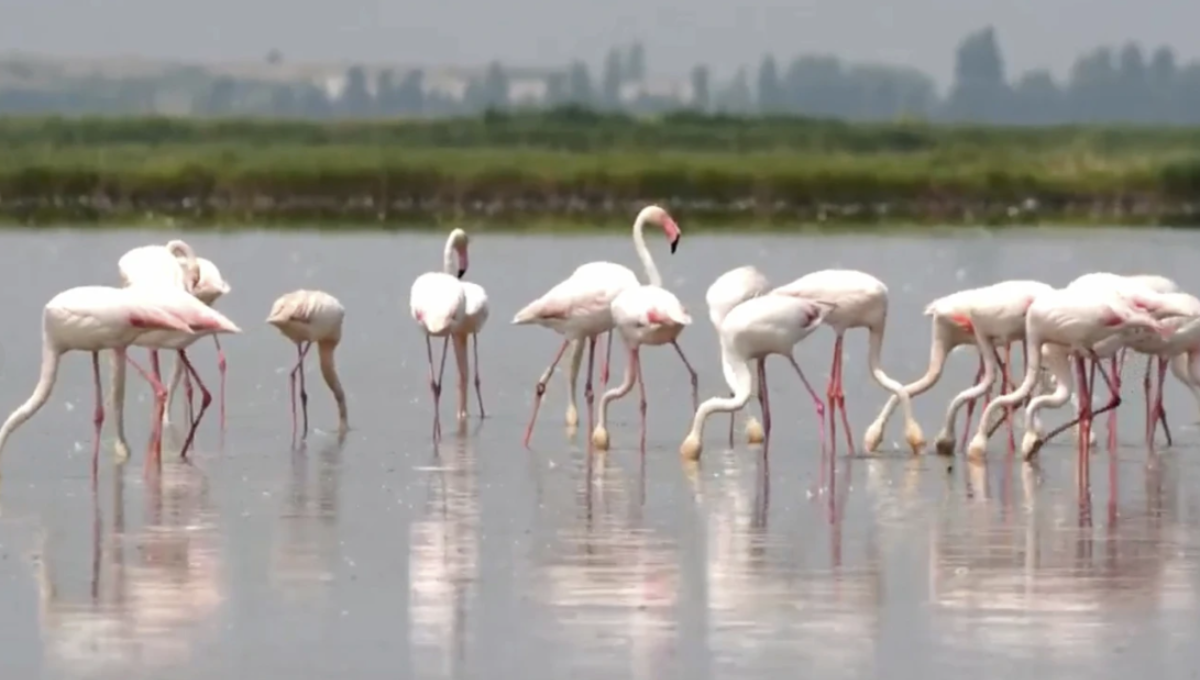An unexpected pest is troubling farmers in northeastern Italy’s rice-growing region: flamingos.
Flocks of these striking birds, relatively new arrivals to the area, have been frequenting the flooded rice paddies in Ferrara province, located between Venice and Ravenna. While flamingos don’t target the rice seedlings themselves, their feeding habits cause significant damage. Using their webbed feet, they stir up the shallow water to catch mollusks, algae, and insects, inadvertently trampling and harming the delicate rice plants in the process.
Farmers have resorted to round-the-clock patrols to scare off the birds. Their tactics include honking truck horns, banging barrels, and firing small gas cannons that produce loud booms. However, these noises usually only drive the flamingos to nearby fields, where they continue their destructive foraging.
Local farmer Enrico Fabbri expressed his frustration after experiencing losses of up to 90% in some of his rice paddies. “This is something completely new,” said Fabbri, 63, standing by his field near Jolanda di Savoia. “You pour so much effort into preparing the crop, and then, just as it begins to grow, it feels like having a newborn child taken away. That’s the pain.”
The flamingos seem to have migrated from their nesting areas in the Comacchio Valleys, a nature reserve on the Adriatic coast south of where the Po River meets the sea. They have been present there since around 2000, after drought conditions in southern Spain pushed them to find new nesting sites further east, explained Roberto Tinarelli, an ornithologist and president of the Emilia-Romagna Ornithologists Association.
Historically, flamingos had been limited to lakes in North Africa, parts of Spain, and France’s Camargue region, Tinarelli noted while near a pond in Bentivoglio, close to Bologna.
No definitive research yet explains why flamingos are now venturing inland to rice paddies, which are flooded by farmers from late spring to early summer to help germinate the rice seeds. Until these fields are drained, the birds pose a serious threat to crops.
Massimo Piva, a 57-year-old rice farmer and vice-president of the local farmers’ confederation, acknowledged the dilemma. “From an environmental standpoint, it’s beautiful to see these birds. But rice farming is one of the most costly and extensive crops here,” he said. “They are beautiful animals and behave naturally, but we need to find ways to minimize their impact.”
Tinarelli recommended more effective and humane methods to deter flamingos than the loud, disruptive approaches currently used. Suggestions include planting tall trees or hedges around paddies or lowering water levels in freshly planted fields to just 2 to 4 inches (5 to 10 centimeters), rather than the usual 12 inches (30 centimeters). This shallower water is enough for rice growth but less attractive to flamingos, which rely on splashing through deeper water to feed.
Also Read:
Fatou, the world’s oldest gorilla in a zoo, is celebrating her 68th birthday in Berlin
UK royals meet Italy’s president and enjoy a special tour of Rome’s Colosseum













